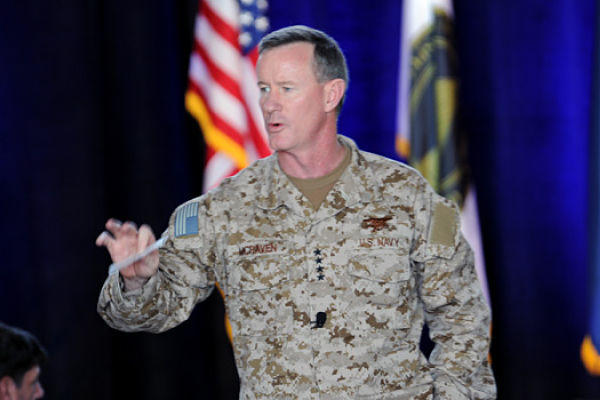The U.S. military is making progress training Afghan security personnel, even as coalition troops and special operations forces leave the country amid a winding down of the war there, according to the country's top Navy SEAL.
Adm. William McRaven, commander of U.S. Special Operations Command, said Afghanistan remains his No. 1 war-fighting priority while confirming the number of U.S. and NATO special operators in the country will decline this year in line with the overall drawdown of foreign troops.
He didn't cite any figures, but there are about 34,000 U.S. combat troops now serving in Afghanistan. After more than a decade of war in the country, the Defense Department wants to keep about 10,000 American service members at a few bases there to help maintain security after 2014. Negotiations on a security agreement have stalled amid resistance from Afghan President Hamid Karzai.
Despite the uncertainty over a long-term U.S. presence -- and a federal watchdog agency's recent criticism --McRaven said he was optimistic about the U.S.-led training mission in Afghanistan.
"I'm pleased to say that each time I return, I see more and more progress," he said during the 25th annual Special Operations and Low-Intensity Conflict conference on Tuesday in Washington, D.C. The three-day event continues Wednesday and was organized by the National Defense Industrial Association, an Arlington, Va.-based trade group. "Afghan security forces are good and thanks to our [special operations forces] investment, they are getting better."
The White House hasn't yet decided on the Pentagon's plan to keep a contingent of troops in Afghanistan for about two years to help provide security for the April presidential elections and to keep training Afghan police and army personnel. Under the proposal, all American forces except those assigned to the U.S. Embassy in Kabul would leave the country when President Barack Obama's term ends in 2017.
"No matter the size of our presence there next year, our future mil-to-mil engagements with the Afghans will remain vital in the region," McRaven said, referring to bilateral military events and training exercises. He didn't say whether U.S. service members would train their Afghan counterparts in another country if leaders fail to sign the bilateral security pact.
McRaven praised the achievements of Afghan personnel, citing the growing ranks of local police -- whom he described as the first line of defense against insurgents, particularly in remote areas -- and last year's "historic" transfer of responsibility for security to Afghan troops.
"No longer are the Afghanistan people relying on coalition forces to play the leading role in providing security," he said.
His comments came a week after the Special Inspector General for Afghanistan Reconstruction concluded in a report that the U.S. military lacks valid methods for measuring the effectiveness of the Afghan National Security Forces. A statement accompanying the audit said the Defense Department "lacks a plan for collecting, validating, analyzing, and reporting on ANSF assessments during the drawdown." What's more, the problem is expected to worsen as coalition troops leave the country and aren't around to monitor the Afghans.
McRaven's single mention of a so-called insider attack, in which Afghans affiliated with the Taliban infiltrate police or military units and open fire on their comrades or international forces, came when he described the actions of Air Force Staff Sgt. Delorean Sheridan, who was recently awarded the Silver Star for killing a Taliban shooter and helping to rescue his colleagues from a coordinated strike.
Karzai wants the U.S. to take a greater role in encouraging the Taliban to enter peace talks with the Afghan government and has been reluctant to grant legal immunity to U.S. troops -- the same sticking point that ended discussions to keep American service members in Iraq.
Separately on Tuesday, Director of National Intelligence James Clapper said he doesn't believe Karzai will sign the security pact. He's the highest-ranking U.S. government official to publicly say so.




























